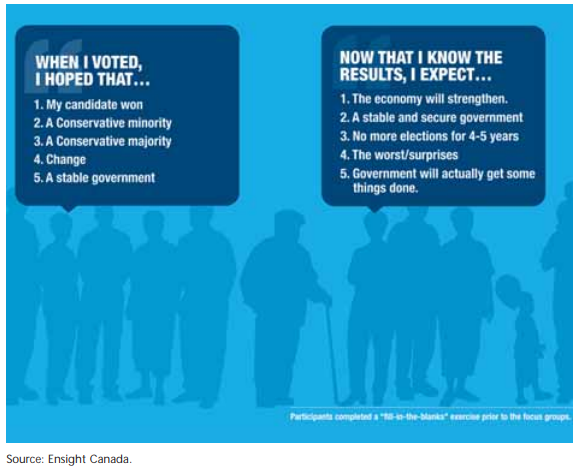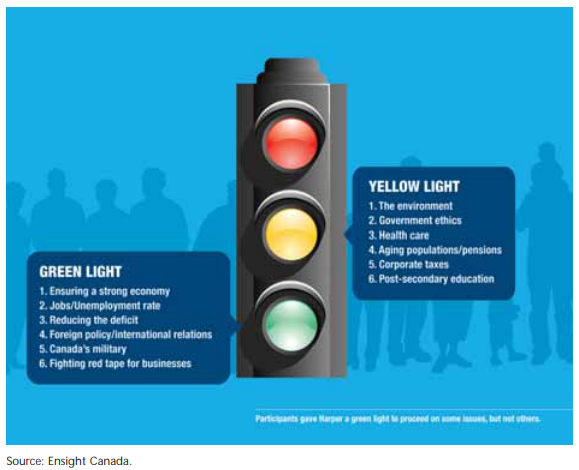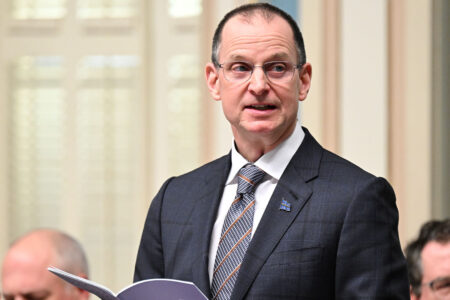
The most troubling finding in our post-election research for any incumbent facing voters this year is this: Your voters are restless.
From the eruption of Danielle Smith in Alberta, through the stunning defeat of one-term New Brunswick premier Shawn Graham, to Naheed Nenshi and Rob Ford’s insurgent mayoralty victories, Canadian voters have been sending their political class a clear and unanimous message: We’re not brand loyal.
Stephen Harper’s majority on May 2, his first in three attempts, may seem a break in this graph of dissatisfaction. Viewed in light of other surprising findings, it’s not. First, he won a small percentage increase in support, and his incredibly efficient party machinery converted those new voters into a much bigger seat count. Second, he was competing against the second-worst Liberal leader — and perhaps the prize-winner for “worst Liberal campaign” ever. And our voters repeated across the country that his mandate is to continuing fixing the economy, but that’s it.
Voters want better performance on the issues they care about today. They are skeptical and grudging in their offers of support. Harper will be judged harshly if the economy stumbles.
Having vanquished Canada’s “natural governing party,” many concluded that Stephen Harper’s majority win signalled a seismic shift in Canadian politics. Not only that, the NDP — never able to break out of a distant third in Canadian politics — had vaulted to Official Opposition status. And the bulk of the party’s seats were won in Quebec. And separatism has been demolished. Mon Dieu! A fundamental realignment, to be sure.
Or is it? Were voters in Quebec reaching for Orange Crush, as one commentator put it? Or were they really going for a box of Cracker Jack? Did Canada move right or did “blue” Liberals abandon the party of Laurier, King and Trudeau in droves fearing an NDP-led coalition?
Unlike 2006 and 2008 when most voters in our research on those elections were comfortable with what we called “government on a short leash,” Canadians this time made it clear that they understand the stability and duration of a majority was necessary to deliver on the changes they expect from their government. Harper gambled in his bid for a clear victory, and this research reveals he read many Canadians right.
Immediately following the election, Ensight Canada took the pulse of voters, inquiring why they cast their ballots the way they did and what this means for Canada’s prime minister, his government and the new Parliament. We held 12 focus groups across the country. We listened to new Canadians, parents, urban professionals, baby boomers, Quebecers, and partisans of all political stripes. For the first time, we also held national online panels made up of young and rural voters and held them in real time, across all time zones.
What we found challenges some of the already emerging conventional wisdom. This election marked a dramatic shift in party loyalties, but it was not realignment or polarization into the red state/blue state model that dominates south of the border.
Voters told us that they made choices based on a very specific set of issues and circumstances. It will not be a predictor of the future unless the surviving political leaders respond to the clear message voters intended them to hear during the election. For Messrs. Harper and Layton, this is a mandate with clearly defined boundaries. Voters want Harper to land the economic recovery. They do not want him to pursue an ideological agenda.
Layton won his position because voters were not happy with the alternatives, but he must still earn his position as Leader of the Opposition. He cannot play PM-in-waiting from the opening Question Period, or behave as if he has a mandate to pursue a strong NDP program. The most common failing of political leaders, government and parties following big wins is to overstate their mandates. Canadian voters are unhappy with the political elites, with their behaviour and with their performance on issues that matter to them. The electorate flunked two leaders and gave the survivors a passing grade.
Quebec voters turfed the Bloc in part because Gilles Duceppe and his aging colleagues did not listen when voters said they were worried about jobs more than another referendum.
The message of Quebec voters this time was a willingness to make a big bet on “le bon Jack,” both to slap the entitlement of the aging Bloc, but also to give a mandate to the new guys to deliver a better life for their families. Layton should understand that his Quebec voters are in sync with other Canadians in our panels, however: Deliver or else.
The Liberals were pounded, in part, because they failed to provide a compelling message beyond fingerpointing. Voters did not believe the election was necessary, they did not accept the Liberals’ case on ethics and they craved being freed from the endless brinksmanship of minority parliament. Indeed, minority fatigue was something we heard about again and again in all parts of the country. Unlike 2006 and 2008 when most voters in our research on those elections were comfortable with what we called “government on a short leash,” Canadians this time made it clear that they understand the stability and duration of a majority was necessary to deliver on the changes they expect from their government. Harper gambled in his bid for a clear victory, and this research reveals he read many Canadians right.
In policy terms, it turns out the polls were right: health care was the number one issue in the election. Voters told us that they are very concerned about Canadian medicare and that they expect their leaders to do something about it. The traditional place of health care as the third rail of Canadian politics is over. Voters told us that they are open to having Ottawa and the provinces explore innovations to improve quality and to contain costs, including the private sector playing a bigger role. Canadians are once again far ahead of their political class: understanding that shouting the same slogans louder is not the same as finding new solutions. Harper has permission to innovate, and Layton has a warning about resisting change: Get in front of the demand for change or get out of the way.
None of this should tempt incumbents to run on their record, or a “trust us!” message, and least of all an attack-heavy campaign. Voters want their governments to take action on the issues they care about, and they will condition their future support on their assessment of performance. Given that we are still shaking off the fear and anxiety of the worst recession most Canadians can remember, this should not be surprising and may even seem obvious.
But contrast the grudging message voters told us about in their choices this time with previous majorities or upheavals. Pierre Trudeau and Brian Mulroney were the enthusiastic choices of a large plurality of Canadians in their sweeps. They received broad mandates to make big changes.
Harper’s is more limited.
Harper’s government can be confident in continuing with its efforts to lower taxes, cut regulation, control spending and increase its appeal to foreign investors, perhaps including changes in ownership rules, but he would be making a big mistake if he felt his mandate included the freedom to launch debates on abortion, hanging or any campaign to raise the role of religion in political life. Our research found that this election will be a predictor of future defeat for Harper if he fails to deliver on the economy, or if he is tempted into the weeds of social conservatism.
Layton, the Pied Piper of la belle province, must harness his astonishingly large gang of young, enthusiastic new Quebec MPs into an effective and attractive political team if he does not want to be swept aside next time. He has an exquisitely challenging mandate test: incorporate Quebec into Canadian federal politics without irritating English Canadians still skittish about even soft nationalist Quebec demands. At the same time, he needs to shape-shift into a centrist Opposition Leader without irritating his base as a sellout to power. Given that he received a much weaker seat count in English Canada — where last minute shifts by blue Liberals to Harper helped deliver his majority — he can neither let Quebec dominate his agenda nor tilt too far from NDP origins if this election is not to be a one-off.
The Liberals received a bittersweet message from our panels. They didn’t like their messenger or his message, but they were not rejecting the brand. They faulted Ignatieff for playing political games and not offering a compelling vision of a better Liberal Canada. But Canada’s strongest political brand is not dead, merely badly managed by its stewards and clearly capable of recovery in the hands of better management.
In the final analysis then: the Liberals get four years to do a massive re-tooling, not simply leadership tinkering. Back to work and stay focused on the economy for Harper. And for Layton, show us you’ve earned this promotion.
For the five or six provincial premiers nervously approaching their own electorates this fall, these voters’ counsel is clear. Acknowledge and take responsibility for the dreams you failed to achieve, admit that you succeeded at less than you struggled hard to deliver, accept voters’ anger at the pain most endured in recent years, and crucially, don’t depend on swagger or attack. Be humble.
Harper succeeded, in part, with these skeptical voters because he didn’t over-promise, sharply ruled out diversions he knew would irritate and left most of his attack work to lieutenants and ad gurus. Layton won new support by acknowledging voters’ anger at politics today — “Ottawa is broken,” he repeated like a zen mantra a dozen times a day — and remembering that a genuine smile is a powerful political weapon.
These are the lessons of our forty-first election — and the pointers to our next series of campaigns — as told to us by Canadians themselves.
Photo: Shutterstock









